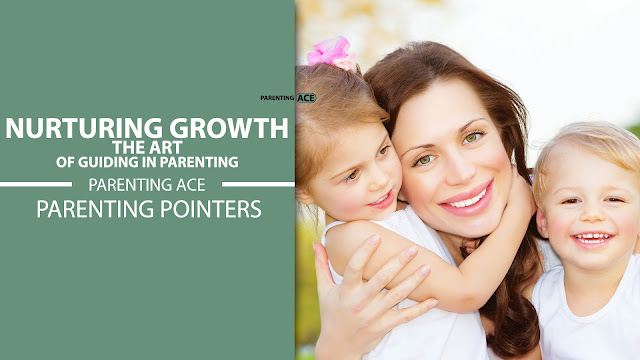Nurturing Growth: The Art of Guiding in Parenting
In the intricate tapestry of parenting, guidance emerges as the guiding star illuminating the path for both parent and child alike. This blog post delves into the profound significance of guidance in the parenting journey, exploring its multifaceted nature, challenges, and transformative power. From the earliest moments of infancy to the tumultuous terrain of adolescence, effective guidance lays the groundwork for nurturing resilient, empathetic, and self-assured individuals. Join us as we embark on a journey to unravel the art of guiding in parenting, where every step taken shapes the destinies of both parent and child.
 |
| Guiding Parenting Growth |
Parenting is often likened to a journey, one filled with twists, turns, and uncharted territories. At its core lies the profound responsibility of guiding a child through life's myriad experiences. This guidance extends far beyond mere direction; it encompasses a delicate balance of support, encouragement, and empowerment. In this article, we delve into the intricate art of guiding in parenting, exploring its significance, challenges, and the transformative impact it holds on a child's development.
The Significance of Guidance
Guidance serves as the compass that steers a child through the maze of life. From the earliest stages of infancy to the tumultuous adolescent years, parents play a pivotal role in providing the necessary support and direction. It involves fostering a nurturing environment where children feel safe to explore, learn, and grow. Through guidance, parents instill values, impart wisdom, and equip their children with the tools to navigate challenges with resilience and confidence.
Challenges Along the Way
However, the path of guidance is not without its obstacles. Parenting demands patience, adaptability, and unwavering commitment. As children evolve and encounter new experiences, parents must adjust their approach to meet their evolving needs. Moreover, external factors such as societal pressures, peer influences, and technological advancements present additional challenges in guiding children towards positive outcomes. Balancing the fine line between autonomy and oversight can also pose dilemmas for parents, requiring thoughtful consideration and discernment.
The Dynamics of Effective Guidance
Effective guidance in parenting entails a multifaceted approach that integrates empathy, communication, and boundary-setting. It involves actively listening to children's perspectives, validating their emotions, and fostering open dialogue. By establishing clear expectations and boundaries, parents provide structure and security while allowing room for autonomy and self-discovery. Furthermore, leading by example serves as a powerful tool in guiding children towards values such as integrity, compassion, and resilience.
The Transformative Impact
The impact of guidance in parenting reverberates far beyond the confines of childhood. Children who receive nurturing guidance from their parents are more likely to develop strong self-esteem, interpersonal skills, and a sense of purpose. They exhibit greater adaptability in navigating life's challenges and forge deeper connections with others. Moreover, the foundation of trust and support established through effective guidance lays the groundwork for healthy parent-child relationships that endure the test of time.
In the tapestry of parenting, guidance emerges as a cornerstone, weaving together the threads of love, wisdom, and empowerment. Through thoughtful guidance, parents illuminate the path for their children, empowering them to embrace the journey of self-discovery and growth. As we navigate the complexities of parenthood, let us recognize the profound impact of our guidance in shaping the lives of our children and nurturing them into resilient, compassionate, and fulfilled individuals.



Comments
Post a Comment